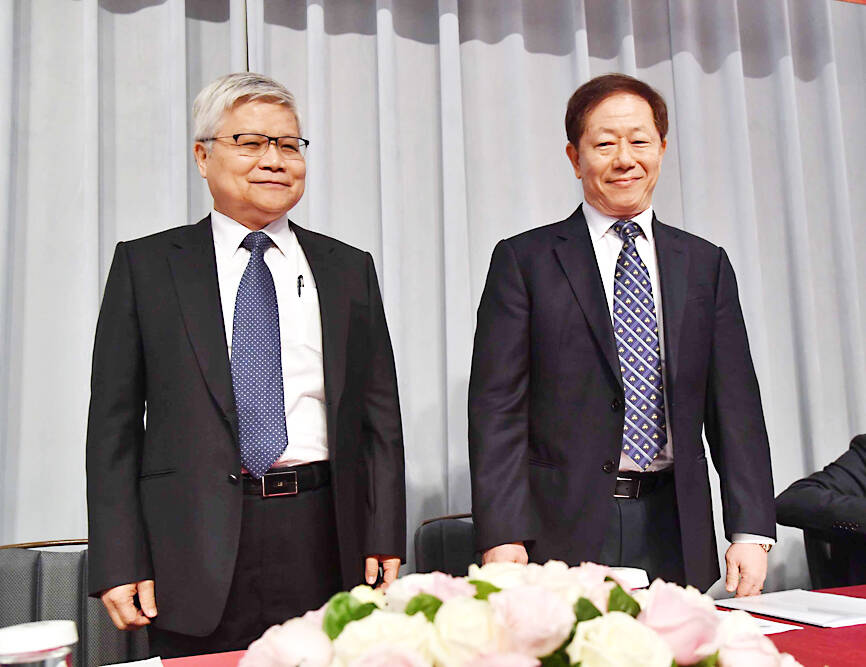Taiwan Semiconductor Manufacturing Co (TSMC, 台積電) chairman Mark Liu (劉德音) is to step down from his position in June next year and the company’s board of directors has nominated chief executive officer C.C. Wei (魏哲家) as his successor, the world’s largest contract chipmaker said yesterday.
Liu has decided not to seek a nomination for a seat on the board and would retire from the company after the annual shareholders’ meeting, TSMC said in a statement.
The board’s nomination, corporate governance and sustainability committee has recommended vice chairman and CEO Wei as the new chairman, it said.

Photo: CNA
The unexpected announcement came as TSMC is gearing up to build overseas operations in the US and Japan to boost supply chain resilience. The chipmaker is also ramping up next-generation technology at home to defend its market leadership amid growing competition from Intel Corp and Samsung Electronics Co.
Liu, 70, joined TSMC in 1993. He was appointed as chairman six years ago following the retirement of founder Morris Chang (張忠謀) in 2018. Since then, TSMC has about tripled its market value to become Asia’s most valuable company.
“The past 30 years with TSMC has been an extraordinary journey for me. I want to extend my sincerest thanks to our incredibly talented team who made the company the global leader it is today,” Liu said in the statement.
“I now would like to put my decades of semiconductor experience to other uses, spend more time with my family, and start the next chapter of my life. I will continue to oversee corporate governance with the board diligently until the last day of this term. I am confident that TSMC will continue to perform outstandingly in the years to come,” Liu said.

RECYCLE: Taiwan would aid manufacturers in refining rare earths from discarded appliances, which would fit the nation’s circular economy goals, minister Kung said Taiwan would work with the US and Japan on a proposed cooperation initiative in response to Beijing’s newly announced rare earth export curbs, Minister of Economic Affairs Kung Ming-hsin (龔明鑫) said yesterday. China last week announced new restrictions requiring companies to obtain export licenses if their products contain more than 0.1 percent of Chinese-origin rare earths by value. US Secretary of the Treasury Scott Bessent on Wednesday responded by saying that Beijing was “unreliable” in its rare earths exports, adding that the US would “neither be commanded, nor controlled” by China, several media outlets reported. Japanese Minister of Finance Katsunobu Kato yesterday also

Jensen Huang (黃仁勳), founder and CEO of US-based artificial intelligence chip designer Nvidia Corp and Taiwan Semiconductor Manufacturing Co (TSMC, 台積電) on Friday celebrated the first Nvidia Blackwell wafer produced on US soil. Huang visited TSMC’s advanced wafer fab in the US state of Arizona and joined the Taiwanese chipmaker’s executives to witness the efforts to “build the infrastructure that powers the world’s AI factories, right here in America,” Nvidia said in a statement. At the event, Huang joined Y.L. Wang (王英郎), vice president of operations at TSMC, in signing their names on the Blackwell wafer to

‘DRAMATIC AND POSITIVE’: AI growth would be better than it previously forecast and would stay robust even if the Chinese market became inaccessible for customers, it said Taiwan Semiconductor Manufacturing Co (TSMC, 台積電) yesterday raised its full-year revenue growth outlook after posting record profit for last quarter, despite growing market concern about an artificial intelligence (AI) bubble. The company said it expects revenue to expand about 35 percent year-on-year, driven mainly by faster-than-expected demand for leading-edge chips for AI applications. The world’s biggest contract chipmaker in July projected that revenue this year would expand about 30 percent in US dollar terms. The company also slightly hiked its capital expenditure for this year to US$40 billion to US$42 billion, compared with US$38 billion to US$42 billion it set previously. “AI demand actually

RARE EARTHS: The call between the US Treasury Secretary and his Chinese counterpart came as Washington sought to rally G7 partners in response to China’s export controls China and the US on Saturday agreed to conduct another round of trade negotiations in the coming week, as the world’s two biggest economies seek to avoid another damaging tit-for-tat tariff battle. Beijing last week announced sweeping controls on the critical rare earths industry, prompting US President Donald Trump to threaten 100 percent tariffs on imports from China in retaliation. Trump had also threatened to cancel his expected meeting with Chinese President Xi Jinping (習近平) in South Korea later this month on the sidelines of the APEC summit. In the latest indication of efforts to resolve their dispute, Chinese state media reported that